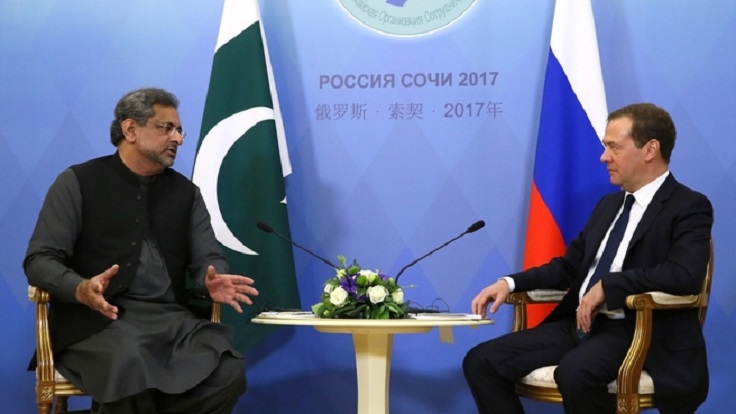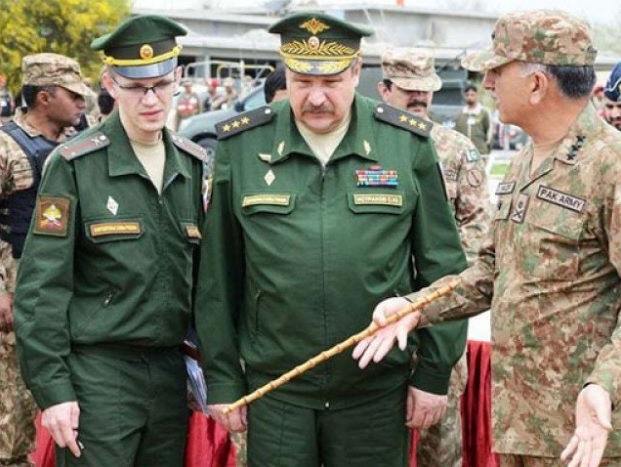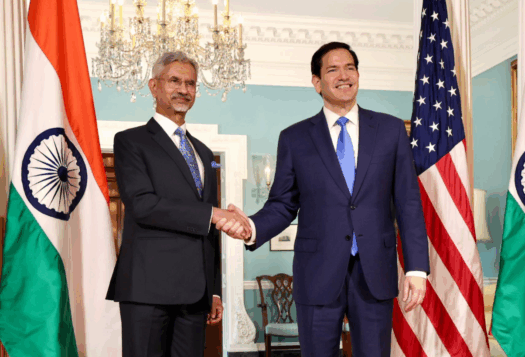
As relations between the United States and Pakistan deteriorate and Washington’s influence over Islamabad decreases, Pakistan and Russia, former Cold War-era rivals, have significantly strengthened their bilateral ties. The rapprochement between the two countries over the past few years has opened up a path toward a strategic relationship, with both sides rapidly building diplomatic and economic ties. A wide range of common security and economic interests have also required that the two develop a military-to-military relationship—Russia and Pakistan’s growing closeness is primarily driven by their shared interest in countering emerging militant threats in the region, specifically in Afghanistan. In so doing, however, they seem to be utilizing and bolstering the Afghan Taliban, in a move that is likely to alienate the United States. Washington’s likely opposition to Moscow and Islamabad’s plans for Afghanistan may further complicate the war-torn country’s political and security situation. Therefore, Pakistan-Russia cooperation is unlikely to bode well for a resolution to the Afghan conflict.
A Strategic Partnership
Islamabad’s desire to engage Moscow strategically is significant, as Pakistan has historically partnered with the United States to oppose Russian presence but is now welcoming Moscow into the region. And now this partnership appears to be growing at the expense of the United States’ military and economic interests in the region: for instance, Islamabad, which for decades has relied on Washington’s military hardware, is now significantly deepening its military ties with Moscow. Military-to-military cooperation between Russia and Pakistan is rapidly increasing: in 2014, both countries signed the Pakistan-Russia Defense Agreement paving the way for increased bilateral defense and intelligence cooperation. In 2016, Pakistani and Russian ground troops took part in a joint military exercise in Pakistan. Last year, a high-level Russian military delegation visited Pakistan’s tribal areas, which included briefings from the Pakistani military regarding its counterterrorism efforts in the region.
Further, signposts in Russian on roads leading to Pakistan’s tribal regions and capital have been erected, indicating that Pakistan’s ties with Russia are more than just tactical. Last month, Pakistan’s Defense Minister, Khurram Dastgir Khan, announced talks with Russia to purchase sophisticated military hardware, including air defense systems and Su-35 fighter jets. And last week, Pakistan offered Russia a “multidimensional strategic partnership” in an effort to expand bilateral relations in the strategic military and diplomatic sectors. Later this year, a contingent of Pakistani troops is expected to travel to Russia in order to participate in a two-week joint military drill focusing on counterterrorism operations, joined by India and China.

Threat of IS
Russia’s growing ties with Pakistan have come against the backdrop of its renewed interest in Afghanistan. The security situation in Afghanistan remains precarious, including due to the growing threat of the Islamic State (IS). IS is ramping up its presence in Afghanistan with its brutal suicide bombing campaign. Russia has expressed concern about the group’s inroads into Central Asia—according to some reports, between 2,000 and 4,000 Central Asians have joined IS already. Following an IS-claimed attack in Saint Petersburg last year, carried out by a Kyrgyz national, Moscow is now worried about growing Islamic extremism along its southern frontier in Central Asia. If IS succeeds in building a strong base in Afghanistan, the group can easily penetrate into Central Asia, and eventually, Russia.
To this end, Russia has claimed that the United States is downplaying “unchecked proliferation of Daesh” in Afghanistan, alleging that Washington’s lack of action has allowed IS to grow in Afghanistan, which is directly threatening Moscow’s interests in the region. Pakistan, which has been at the receiving end of IS attacks, has backed this Russian claim. To counter the threat of IS in Afghanistan and beyond, Pakistan and Russia recently announced the creation of an anti-terror military cooperation commission. Arguably, for both Moscow and Islamabad, the worsening security situation in the region is due to Washington’s policy of non-engagement with the Taliban, who remain key stakeholders in any negotiated settlement of the Afghan conflict. While the United States remains focused on countering the Taliban in Afghanistan, Washington is unable to thwart the presence of IS in the country.
Diminishing U.S. Influence
It is no secret that Pakistan and Russia’s ties are thriving at a time when Pakistan and the United States’ bilateral relations are weakening, furthered by the United States’ aggressive South Asia strategy that has put Pakistan under the microscope. Holding Pakistan accountable for fueling terrorist activity in Afghanistan, Washington suspended military aid to Islamabad earlier this year until quantifiable action was taken against the Taliban and Haqqani militants in the region. While Pakistan is alienated from the United States, it has developed consensus with Russia and China on important regional security issues.
Conclusion
Russia and Pakistan now acknowledge that close military and diplomatic cooperation serves the regional security interests of both sides. With Pakistan relying more on Russia to fulfill its military and security objectives, the United States’ influence over Pakistan will inevitably diminish further. It remains to be seen what Washington’s reaction to this strategic realignment of ties will be. On the other hand, however, this emerging shift which sees Washington’s longtime ally, Islamabad, partnering with its longtime rival, Moscow, will only create an environment of competition rather than cooperation in Afghanistan, which is fast becoming the center of regional geopolitical rivalries. Given the existing regional security situation, continued threat of militancy, and shifting of interests, one thing remains clear: Pakistan and Russia’s strategic partnership is here to stay for the foreseeable future.
***
Image 1: The Kremlin
Image 2: ISPR


